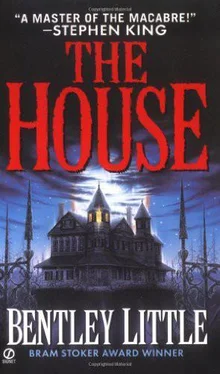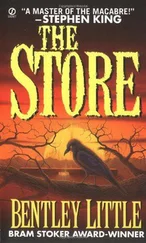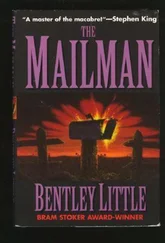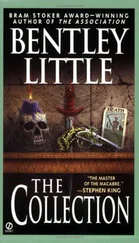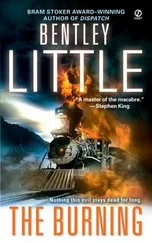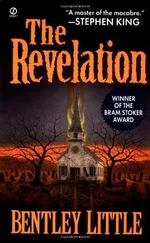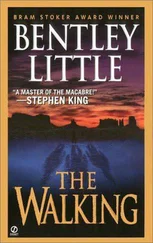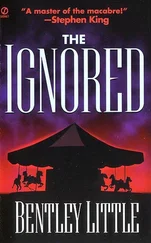If they were both mute, they could have a happy life.
He settled into sleep beside her, and she turned onto her side. He stretched one arm over her shoulder, resting his hand on her breast, and she pressed her buttocks against his groin, automatically finding, even in sleep, the position they'd discovered to be most comfortable.
Despite his tiredness and the lateness of the hour, he did not fall asleep instantly but drifted slowly off, his mind focusing on nothing and everything, his thoughts moving from Carole to school to old friends to his
trip to Italy to the president's recent trip to Japan, floating gradually away in ever-widening circles, his brain making connections of logic that were at first tenuous, then not there at all but seemed perfectly natural as sleep overtook him.
He was awakened by violent shaking.
Norton sat up immediately, his panicked heart thumping as though it were about to burst through his chest. He thought at first it was an earthquake but realized almost instantly that only the bed was shaking, that the hanging plant next to the curtained window was still, that the rest of the room was not in motion.
A foot kicked his leg. A hand lashed out at his midsection.
It was Carole.
She was having convulsions.
He had no idea what to do, and even as he kicked off the covers and twisted around, grabbing her shoulders, trying to hold her down and stop her from shaking, he was cursing himself for not attending the CPR seminar the last time they'd had a teacher's in-service day. He hadn't thought there'd ever be a practical use for it.
Carole was in better health than he was, and he couldn't see himself doing anything to help a stranger except dial 911, so he'd chosen to stay in his classroom and rearrange his bulletin boards instead of attend the emergency medical training.
Now he felt lost and frightened and completely out of his depth. Carole's eyes were wide open and jiggling crazily in their sockets as her entire head shook in staccato spasms. Her mouth was open, tongue hanging out, looking twice as long as he knew it to be, and saliva was flying out in all directions, strings of it stretched over her cheeks and chin, independent spray hitting the pillow and the blanket and his arm. Beneath his hands, the muscles of her chest and shoulders were knotted and tight, much stronger than any muscles he'd ever felt before, and they were jerking nonstop in a frighteningly unnatural way.
He didn't know what was happening. He was pretty sure this wasn't a heart attack, but whether it was an epileptic fit or a stroke or the result of some sort of brain tumor, he had no clue. It was like something out of a movie, like a possession, and he had no idea if he was supposed to be holding her still or leaving her alone or giving her some kind of medicine. He'd heard somewhere that if someone was having a fit you were supposed to put a wallet in their mouth to keep them from swallowing their tongue, but Carole's tongue was flopping around outside her mouth, and she appeared in no danger of swallowing it.
The fit wasn't letting up.
He didn't know how much time had passed since she'd started convulsing, since the shaking had awakened him, but even adjusting for his skewed perceptions, it had to have been several minutes.
Shouldn't it have stopped by now?
If anything, the muscles beneath his grip were becoming more rigid, their vibrating spasms stronger and more violent. How long could a body continue undergoing something like this without sustaining permanent damage?
Wasn't her brain being smacked around in that jerking head? Weren't her organs being knocked about inside her chest cavity?
There'd been no sound coming out of her mouth, only the unnaturally silent, almost sibilant noises of her convulsing body, overpowered by the loud wood-on-wood sound of the headboard hitting the wall, but now there was a low humming coming from somewhere deep within her throat, a humming broken by vibrato as the sound escaped her wildly shaking head.
He let go, got off her, leaped from the bed. This had gone too far. It wasn't slowing or abating, and it was obvious that his attempt to hold her still, to force her body to stop shaking, to will her convulsions to end, was not working at all.
He ran out of the bedroom, ran for the phone, picked it up from the alcove in the hall, dialing 911 at the same time he tried to lift the receiver to his head. He told the robotically calm woman at the other end of the line who he was, where he was, and what was happening, and though the entire conversation probably took no more than one minute, it felt like fifteen. The woman promised to immediately dispatch paramedics and an ambulance, and he dropped the phone without bothering to hang up and ran back down the hallway to the bedroom.
By the time he returned, the attack was all over. Car ole had stopped convulsing.
She was dead.
Stormy Stormy Salinger drove back from Taos along the series of interconnected roads that led through the Sangre de Cristo Mountains. The highway was faster, but he preferred the back way, and he hauled ass on the stretches between villages to make up the time.
Through the windshield, the huge sky was light blue, the ever-present white clouds retreating to infinity like a Georgia O'Keeffe painting.
He loved this drive. The meadows, the streams, the trees, the ranches. This was why he had moved here, why he had left Los Angeles. He shut off the air conditioning, rolled down the car window, felt the wind in his face, smelled pine and hay, dust and water.
In L.A., he'd been afraid to roll down his windows as he drove. Not just because of the potential forcarjackings and robberies, not just because he'd be hit up for money by the homeless vets who staked out intersections and on-ramps, but because the air itself was poisonous.
The dirtiest air in the country, year in and year out.
Hell, even on days that had what southern California's TV weathermen called "good air quality," it was still rare to see the San Gabriel Mountains until you were almost on top of them.
That was not a way to live.
He'd grown tired of Los Angeles: the place, the people, the lifestyle. He'd grown tired of his friends as well, their smugness, their self-absorption, their condescending attitude toward anyone outside their clique, the mandatory elitism that afflicted what passed for their culture.
He'd fallen in with a group of film snobs--hip writers for entertainment publications, young academics from prestigious film schools, wannabe indie figures--people with little in common save their interest in cinema. As a successful video distributor, a lifelong movie fan who had made millions working on the fringes of filmdom, he himself was an inspiration to his friends, proof that the wall could be breached, yet he knew that while they pretended to be supportive of him and had no qualms about taking advantage of his generosity, they were, at the same time, jealous, and when a serious discussion of film came about--as it often did--his opinions were treated with slightly less respect, just to let him know that he was not really in their intellectual league.
That had always irritated the hell out of him.
He was the only member of the group who exhibited even the least bit of independence, who did not automatically fall in with the prevailing opinion and conform to preexisting tastes with lockstep homogeneity. They were nobodies, really, but they always acted as though they were society's arbiters of filmic quality, and it was a given that any film of which they approved was a work of art. They'd sit around and summarily dismiss contemporary comedies, yet rhapsodize about a Laurel and Hardy pie fight. It wasn't that the pie fight was intrinsically better than, say, the slapstick antics in a Jim Carrey movie, it was just that they considered it "classic," and that was automatically supposed to elevate its level of quality.
Читать дальше
